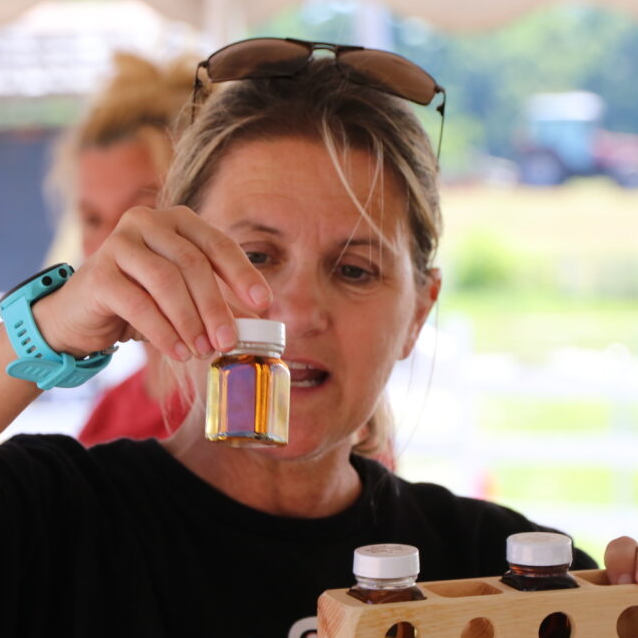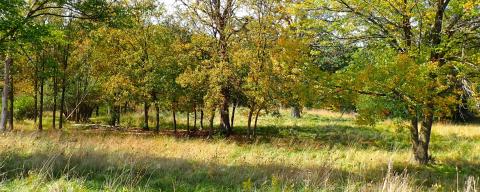Professional Development Opportunity for Educators
Farms, Forests, and the Future: Teaching Agroforestry
Teaching Sustainable Agriculture
Agroforestry is a method of sustainable agriculture that pairs ecological and agricultural management practices. Farm, Forests, and the Future (FFF) is a comprehensive professional and personal development program for formal educators, informal educators, and youth advocates interested in bringing agroforestry principles and ideas into their educational settings.
This PD experience includes in-person workshops, field trips to New England farms, face time with industry professionals and researchers, and a community of educators excited to learn and grow together.
APPLY TO FARMS, FORESTS and the FUTURE
Events
-
January 23, 2026
 8:30am - 4:00pm, Join us for this educator focused, educator developed symposium on maple sugaring in schools. With a variety of teacher-led workshops, the symposium is an
8:30am - 4:00pm, Join us for this educator focused, educator developed symposium on maple sugaring in schools. With a variety of teacher-led workshops, the symposium is an
-
February 27, 2026
10:00am - 2:00pm, We will visit this southern NH sugaring operation that has grown from a small backyard operation to over 33,000 taps this past winter. The new
-
March 23, 2026
 10:00am - 2:00pm, We will visit two locations at the University that are working in conjunction with the ADAPT agroforestry research team. First we’ll visit Evan Ford and
10:00am - 2:00pm, We will visit two locations at the University that are working in conjunction with the ADAPT agroforestry research team. First we’ll visit Evan Ford and
As the world population continues to grow, the demand for resources increases as well. Agroforestry looks to meet those needs by implementing agricultural practices that value the natural ecosystems on the planet and work to both protect diversity and help meet resource needs of the population in a sustainable way. Examples of agroforestry include:
- Grazing cattle and other livestock among fruit orchards.
- Managing the growth of high-value crops under forest canopy.
- Growing crops in between tree rows, providing shade for crops and other benefits.
Many agroforestry practices have been employed by indigenous people for thousands of years and are now being studied and implemented in the New England modern agricultural landscape. This program aims to build agroforestry knowledge and skills among high school students to support their capacity to become future leaders in the science and policies around sustainable food production.
- Receive 1 – 2 years of professional development and mentoring that is (mostly) flexible with your schedule.
- Receive a $1,200 stipend
- Visit NE based farms implementing Agroforestry principles
- Collaborate and learn alongside a community of peers
- Network with industry professionals and researchers
- Attend one of two national conferences, all expenses paid
The goal of this program is to introduce educators to the guiding principles of agroforestry and sustainable agriculture and to expose educators to examples of these in New England. The expectation is that educators will develop a lesson (or modify an existing lesson) to present in their educational setting that embodies these principles and/or practices. Educators will have two years to complete the following activities (all activities are required to receive the stipend):
- Take pre and post educator surveys
- Attend an introductory Zoom meeting in September (date TBD)
- Attend a two-day intensive workshop, October 6 & 7, 2025 in Hanover, NH (all expenses paid)
- Attend three field experiences (multiple dates available)
- Attend one development workshop (multiple dates available)
- Present on your experience at one of three showcases (multiple dates available)
- Submit developed materials, including: implemented lesson, evaluation plan, student evaluation data
Below are the dates of required and optional activities. There are some requirements as to the number of optional activities that must be attended to be eligible for the “field experience”, these have been noted below. All requirements must be met in order to receive the $1,200 stipend.
Required activities:
- September, 2025: Introductory Zoom session
- October 3 & 4: Two-day intensive workshop (Hanover, NH; all expenses paid)
Field Activities (must attend 3 over the course of two years, workshops subject to change)
Development workshop (must attend at least one of the course of two years, specific dates still TBD):
- April 2026
- More dates to come during 2026 – 2027 school year
Presentation opportunities (must attend and present your experience in the program at one of these):
- 4-H Volunteer’s Conference (April 10 – 12, 2026)
- Farm, Forest, and Garden Expo
- School to Farm Days (various locations and dates)
OPTIONAL: May attend one of these conferences, all expenses paid, not required to receive the stipend:
- National Ag In The Classroom Conference, June 2026
- Missouri Agroforestry Conference 2026
Contact Information
Mike Smith, 4-H Ag In the Classroom Program Manager, Michael.smith1@unh.edu
This work is supported by the US Department of Agriculture, NIFA-SAS grant #123099601
*Please note that continuation of the program and stipends are contingent on continued Federal funding. Unexpected changes to the program may occur.
